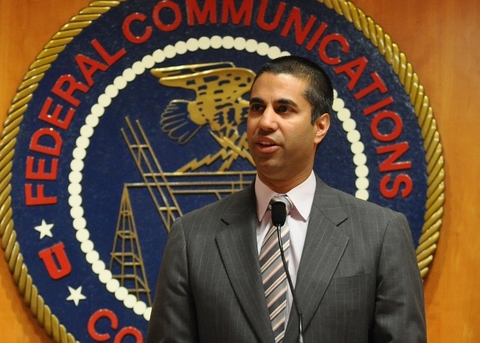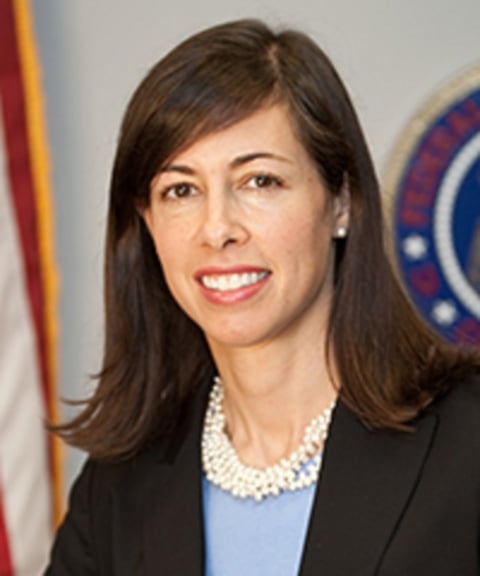As expected, the FCC has voted along party lines (3-2) to overturn the net neutrality rules during its December monthly meeting, bypassing calls from public interest and consumer groups as well as between FCC commissioners.
FCC Chairman Ajit Pai was joined by commissioners Michael O’Rielly and Brendan Carr in voting for the measure, while commissioners Jessica Rosenworcel and Mignon Clyburn dissented.
In its Declaratory Ruling, Report and Order, the FCC sought to restore internet freedom by returning broadband internet access service to its prior classification as a Title I information service and reinstate the private mobile service classification of mobile broadband Internet access service.
The new net neutrality proposal is to reverse the agency’s 2015 decision to regulate broadband internet access service under Title II of the Communications Act. The regulator will reclassify ISPs as information providers under Title I.
RELATED: FCC’s Pai circulates draft order to overturn net neutrality rules
Pai and service providers say the current rules have inhibited investments.
Additionally, the action puts the Federal Trade Commission (FTC), an agency that critics say does not have the technical prowess to oversee the internet, in charge of overseeing ISPs' actions. Earlier this week, the FCC released a draft memorandum of understanding on how it and the FTC would enforce penalties on ISPs that harm consumers.
As part of Pai’s plan to overturn the current rules, the FTC would oversee ISPs’ actions and enforce any penalties if rules are not followed or are abused.
According to the rules put in place in 2015 during Chairman Tom Wheeler’s era, cable and telecom providers are not allowed to block or slow down any websites or apps. These rules also prohibit broadband providers from striking special deals that would give some websites or apps "priority" over others.
The fear is that overturning the current rules will put more power into the hands of broadband providers to effectively govern how consumers and businesses interact with the internet.
Telcos such as AT&T, say that the new rules will not drive them to control the internet experience for their users.

“For more than a decade, under both Republican and Democratic Administrations, AT&T has consistently made clear that we provide broadband service in an open and transparent way,” said Bob Quinn, SVP of external and legislative affairs for AT&T, in a statement. “We do not block websites, nor censor online content, nor throttle or degrade traffic based on the content, nor unfairly discriminate in our treatment of internet traffic. These principles, which were laid out in the FCC’s 2010 Open Internet Order and fully supported by AT&T, are clearly articulated on our website and are fully enforceable against us. In short, the internet will continue to work tomorrow just as it always has.”
Quinn added that AT&T will "continue to support a legislative solution and will work with any interested members of Congress to achieve that solution.”
However, Michael Fauscette, chief research officer at G2 Crowd, said in a statement provided to FierceTelecom that “ISPs will effectively be left to regulate themselves.”
“There will be plenty of lawsuits attempting to put the protections back in place, so this is not over,” Fauscette said. “There also is a call for Congress to step in and pass legislation to put the regulations back in place, but with a Republican-controlled House and Senate, it’s not likely to pass anytime soon. Look for the return of “fast lanes” (and of course “slow lanes”) which will cost many companies, but will also ultimately cost consumers and restrict the free flow of information across the internet.”
While the new rules have passed, the battle over this issue far from over. Twitter and over 200 other businesses had asked the commission to keep the rules, saying the elimination of net neutrality will run counter to competition. And BattleForTheNet.com and Team Internet have announced an internet-wide campaign to demand that elected officials in Congress use a Resolution of Disapproval under the Congressional Review Act to overturn the FCC’s rulemaking.
“The backlash to the FCC’s attack on the internet has reached a boiling point,” said BattleForTheNet.com and Team Internet in a statement. “Now every member of Congress will have to go on the record and decide whether to stand up for the free and open internet or face the political consequences of awakening its wrath in an election year.”
A commission divided
While the measure passed, the net neutrality issue continues to be a divisive issue within the FCC itself.
There have been two main arguments on this issue. Supporters of the current rules say that the FCC is acting recklessly while those that opposed the Title II framework argue it has inhibited service providers from growing their networks.
FCC Chairman Ajit Pai, a staunch supporter of net neutrality reform, said that since the 2015 net neutrality rules were passed, investments in broadband networks have declined by billions of dollars.

Notably, this is the first time that such investment has declined outside of a recession in the Internet era. When there’s less investment, that means fewer next-generation networks are built. That means less competition. That means fewer jobs for Americans building those networks. And that means more Americans are left on the wrong side of the digital divide."
Pai added that the impact of the Title II regulation has been a big issue for smaller ISPs like Wave Wireless and Amplex Internet that don’t have the legal teams of a large telco or cable operator.
“It’s no surprise that the Wireless Internet Service Providers Association, which represents small fixed wireless companies that typically operate in rural America, surveyed its members and found that over 80% “incurred additional expense in complying with the Title II rules, had delayed or reduced network expansion, had delayed or reduced services and had allocated budget to comply with the rules,” Pai said in a statement.
Alternatively, FCC Commissioners Jessica Rosenworcel and Mignon Clyburn issued statements criticizing the regulator’s action as being harmful to consumers.

“Net neutrality is internet freedom. I support that freedom,” Rosenworcel said. “I dissent from this rash decision to roll back net neutrality rules. I dissent from the corrupt process that has brought us to this point. And I dissent from the contempt this agency has shown our citizens in pursuing this path today. This decision puts the Federal Communications Commission on the wrong side of history, the wrong side of the law, and the wrong side of the American public.”
Rosenworcel added that what’s also troubling about the ruling is that the FCC has not held a single public hearing on net neutrality.”
Clyburn agreed and added that reclassification broadband under Title I will have a rippling effect on other programs within the FCC such as Lifeline and new broadband expansion efforts.
“Reclassification of broadband will do more than wreak havoc on net neutrality,” Clyburn said. “It will also undermine our universal service construct for years to come, something which the Order implicitly acknowledges. It will undermine the Lifeline program. It will weaken our ability to support robust broadband infrastructure deployment. And what we will soon find out, is what a broadband market unencumbered by robust consumer protections will look like. I suspect the result will not be pretty.”
Lawmakers ask for pause
The division about the new rules aren’t just relegated to the FCC.
A group of Republicans and Democrats, according to a Verge report, have also asked the FCC to take more time.
Rep. Mike Coffman (R-CO) sent a letter to FCC chairman Ajit Pai asking to delay deciding so Congress pass legislation on the issue.
“The Internet has been and remains a transformative tool, and I am concerned that any action you may take to alter the rules under which it functions may well have significant unanticipated negative consequences,” Coffman said. “Therefore, I urge you to delay your upcoming vote and provide and provide Congress with the opportunity to hold hearings on the net neutrality issue and to pass permanent open Internet legislation.”
Coffman is not the only Republican speaking out about the FCC’s reworking of the net neutrality rules.
Sen. Susan Collins (R-ME) issued a statement in November finding fault with Pai’s plan.
A spokesperson said that “internet providers must not manage their system in an anti-competitive way that limits consumers’ choices.”